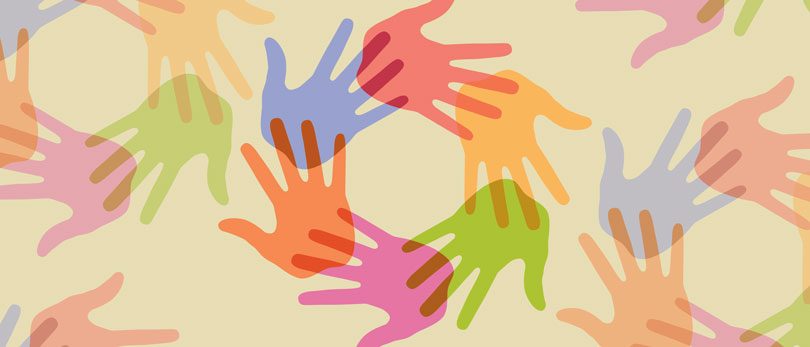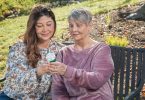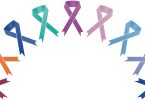Cancer patients experience a number of important transitions during their care, from diagnosis through treatment and survivorship,” says Ruth Manzer, RN, OCN, cancer nurse coordinator. “We meet with patients face-to-face and make them aware of the many support services that are available to them at each point along the way. We want them to know they are not alone. We empower patients to set goals and make decisions about their own care. We are here to help them thrive.”

We empower patients to set goals and make decisions about their own care. We are here to help them thrive. — Ruth Manzer, RN, OCN
At UHS, cancer patients are supported every step of the way by a team of expert doctors, nurses, therapists and other specially-trained health care professionals. After diagnosis, dedicated cancer nurse coordinators and social workers consult with patients to provide a seamless route to complementary services that support their individual health and well-being.
When patients have finished treatment, Ms. Manzer helps them develop a personalized survivorship care plan. This includes referral to a wealth of community resources, and follow-up by Ms. Manzer if requested. The goal is to get patients back to doing their favorite activities and enjoying life, she says. “People are living longer lives with cancer, and sometimes it is managed like a chronic disease. If desired by the patient, we are available to follow his or her progress after treatment and provide a connection to resources as needs arise.”
 Physical therapy
Physical therapy
Throughout the continuum of cancer care, physical therapists measure each patient’s mobility status and energy level. Supervised therapeutic exercises aid patients in maintaining the range of motion, motor control and balance they had prior to treatment, as well as to help manage any cancer-related fatigue.
 Occupational therapy
Occupational therapy
Occupational therapists assist patients in performing activities of daily life despite the limitations cancer or its treatment may cause. Therapy is tailored to the individual, with exercises and advice designed to help patients maintain their abilities and normalcy in their day-to-day life. This can include anything from showering and getting dressed to doing household chores and enjoying hobbies such as gardening and golf.
 Nutrition therapy
Nutrition therapy
The right diet is crucial to the health and well-being of cancer patients, but may be challenging when cancer or its treatment affects appetite, the sensation of taste or even the ability to eat. Nutritional therapists meet with patients individually to discuss diet, nutrition and supplements. They help patients maintain a healthy weight and energy level.
 Speech therapy
Speech therapy
Certified speech therapists specialize in helping patients restore and maintain speech capabilities. They also help patients restore weak or lost swallowing function. This service may be triggered by a referral from the patient’s doctor or other UHS cancer rehabilitation therapists, most often for those who are undergoing head and neck cancer treatment.
 Lymphedema services
Lymphedema services
Patients who have had lymph nodes removed during treatment are at risk of lymphedema, a painful swelling of the associated limb. At UHS, patients are regularly assessed throughout their care to catch signs of lymphedema early, when it is most manageable. In therapy, patients may receive specialized massage to lessen swelling and learn techniques that can keep swelling under control and help maintain mobility in the affected limb.
 Home care
Home care
UHS Home Care provides an array of in-home services for the approximately 90 percent of cancer patients who receive outpatient cancer care, and for those returning home after a hospital stay. Services include infusion, skilled nursing, maintenance of medical supplies and equipment, and rehabilitation therapies.”
ALL TOGETHER NOW
During and after cancer treatment, patients and their families can benefit from attending these free UHS support groups.
Women’s Expressive Art Support Group
1st Tuesday of every month, Noon–1:30 p.m.
UHS Stay Healthy Center, Oakdale Mall
This group supports women who currently have or have had cancer with the goal of encouraging creativity, resiliency and empowerment. There are open discussions and opportunities for self-expression. No previous artistic experience is required.
2nd Tuesday of every month, 5:30–6:30 p.m.
UHS Stay Healthy Center, Oakdale Mall
Join oncology nurse Ruth Manzer for tea and conversation about life with cancer. Ruth has worked with hundreds of cancer patients and can help you find the answers to your questions.
2nd Thursday of every month, 5:30–6:30 p.m.
UHS Vestal, third-floor lobby
Join us as we share news, valuable information and resources for those diagnosed with lymphedema. Support groups have proven to be an important part of living well with the condition.
3rd Tuesday of every month, 6–7 p.m.
UHS Radiation Oncology, Johnson City
Men living with cancer meet monthly in this group to talk about cancer-related issues. Grab an empty mug and join us. We’ll fill it with coffee and tackle your top cancer-related concerns.
3rd Tuesday of every month, 6–7 p.m.
UHS Stay Healthy Center, Oakdale Mall
This group provides a place to share experiences and meet others who are helping to care for a loved one with cancer. Discussion is facilitated by a clinical social worker.
3rd Wednesday of every month, 6–7 p.m.
UHS Vestal, third-floor lobby
Learn about an array of complex medical treatment options in the company of others. This group includes women who have already made choices about their treatment options or who are currently making them.
Contact the Stay Healthy Center at 763-5092 for dates and times and to register.
Cafeteria conference room, Picciano 1
This nutritional support group for those with cancer and their caregivers meets monthly and is facilitated by a registered dietitian. Registration is required.







